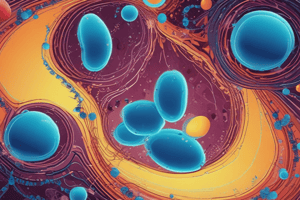Podcast
Questions and Answers
What is the primary role of potassium (K+) in the body?
What is the primary role of potassium (K+) in the body?
- Muscle contraction and excitation (correct)
- Metabolism of carbohydrates
- Regulating blood pressure
- Formation of blood clots
What happens to the resting membrane potential (RMP) with elevated plasma K+ levels?
What happens to the resting membrane potential (RMP) with elevated plasma K+ levels?
- It becomes less negative (correct)
- It increases dramatically
- It remains unchanged
- It becomes more negative
What percentage of the body’s total K+ circulates in the plasma?
What percentage of the body’s total K+ circulates in the plasma?
- 5%
- 10%
- 15%
- 2% (correct)
What can severe hyperkalemia lead to?
What can severe hyperkalemia lead to?
Which of the following cellular functions is NOT significantly influenced by K+ levels?
Which of the following cellular functions is NOT significantly influenced by K+ levels?
What effect does a lower than normal difference between resting and action potential have on the cell?
What effect does a lower than normal difference between resting and action potential have on the cell?
Flashcards
Potassium: Intracellular Dominance
Potassium: Intracellular Dominance
Potassium (K+) is the main positive ion found inside cells, with 20 times higher concentration inside cells compared to outside.
Potassium's Tight ECF Control
Potassium's Tight ECF Control
The body tightly controls the amount of K+ in the fluid surrounding cells (ECF) to ensure proper cell function, keeping it low.
Plasma Potassium's Scarcity
Plasma Potassium's Scarcity
Only a small fraction (2%) of the body's total K+ circulates in the blood (plasma), highlighting the importance of its regulation.
Potassium's Diverse Roles
Potassium's Diverse Roles
Signup and view all the flashcards
Hyperkalemia: Muscle Weakness
Hyperkalemia: Muscle Weakness
Signup and view all the flashcards
Severe Hyperkalemia: Paralysis
Severe Hyperkalemia: Paralysis
Signup and view all the flashcards
Study Notes
Potassium Function in the Body
- Potassium (K+) is the main intracellular positive ion, 20 times more concentrated inside cells than outside.
- Only 2% of total body potassium circulates in the plasma.
- Potassium plays crucial roles in regulating neuromuscular excitability, heart contraction, intracellular fluid volume, and hydrogen ion concentration.
- Potassium significantly affects skeletal and cardiac muscle contraction.
Effects of Elevated Potassium
- Elevated plasma potassium (hyperkalemia) lowers the resting membrane potential (RMP) of cells, making it closer to zero.
- This reduced difference between resting and action potentials increases cell excitability, potentially leading to muscle weakness.
- Severe hyperkalemia can drastically raise the RMP above the action potential, causing a lack of muscle excitability, which may result in paralysis and fatal cardiac arrhythmias.
Studying That Suits You
Use AI to generate personalized quizzes and flashcards to suit your learning preferences.




